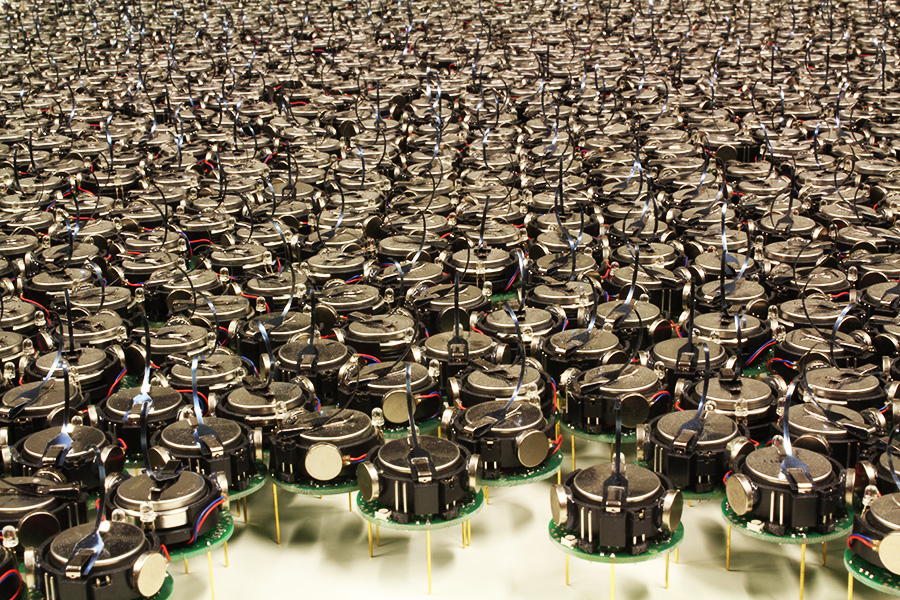
Robohub.org
How can swarm roboticists contribute to and benefit from the wisdom of other disciplines?
 What can swarm roboticists learn from policy makers, systems biologists and physicists, and vice versa? It is already widely recognised that Robotics is an inherently interdisciplinary field and that designing even a single robot might require input from multiple domains. In Swarm Robotics, interactions between robots add further layers of complexity. Indeed, the ‘complex’ nature of robot swarm systems demands approaches going beyond reductionist scientific models or traditional engineering design methods. Like many other emerging technologies, such as synthetic biology and socio-technical systems engineering, robot swarms can be notoriously difficult to predict due to their non-linearity, interconnectivity, hidden heterogeneity and ’emergence‘. Yet it is also this ‘complexity’ that swarm roboticists seek to exploit in order to give intelligent, robust, adaptive behaviours.
What can swarm roboticists learn from policy makers, systems biologists and physicists, and vice versa? It is already widely recognised that Robotics is an inherently interdisciplinary field and that designing even a single robot might require input from multiple domains. In Swarm Robotics, interactions between robots add further layers of complexity. Indeed, the ‘complex’ nature of robot swarm systems demands approaches going beyond reductionist scientific models or traditional engineering design methods. Like many other emerging technologies, such as synthetic biology and socio-technical systems engineering, robot swarms can be notoriously difficult to predict due to their non-linearity, interconnectivity, hidden heterogeneity and ’emergence‘. Yet it is also this ‘complexity’ that swarm roboticists seek to exploit in order to give intelligent, robust, adaptive behaviours.
But what does it mean to describe systems as complex? How do these complex systems differ from the more easily understood ‘modular’ systems that we are familiar with? Vocabulary in this area is often dangerously inconsistent. For example, the terms ’emergence’, ‘complex’, and ‘complicated’ are used differently by different disciplines, and often differently even within the same discipline. This makes it very difficult to understand whether people are really talking about the same thing, and whether the systems being described are different in superficial or profound ways. On the one hand, failing to identify the underlying similarities between different systems (whether modular or complex) results in missed opportunities for sharing knowledge, best practices and methods. On the other hand, failing to identify the underlying differences between different systems results in practices and methods being misapplied. More broadly, many of today’s real-world problems require engineers, designers and policy-makers across all domains to think in terms of complex systems.
 To address problems with translating between disciplines, Chih-Chun Chen and Nathan Crilly at the University of Cambridge have produced ‘A primer on the design and science of complex systems’. This introduces complex systems constructs by building them up from basic concepts, and contrasting them with more familiar constructs that are associated with modularity. For example, ’emergence’ can be understood with respect to a breakdown in how a system’s functions are mapped to the structures that perform those functions. Abstract diagrams that are independent of any particular domain are used to represent the constructs that are discussed. These are illustrated with worked examples that make the explanations accessible for those who have no experience with ‘complexity’. The primer is intended to provide both an introduction to complex systems constructs for those new to the topics discussed, and also a basis for cross-domain translations for researchers and practitioners wishing to engage with other fields when addressing the systems problems they are working on.
To address problems with translating between disciplines, Chih-Chun Chen and Nathan Crilly at the University of Cambridge have produced ‘A primer on the design and science of complex systems’. This introduces complex systems constructs by building them up from basic concepts, and contrasting them with more familiar constructs that are associated with modularity. For example, ’emergence’ can be understood with respect to a breakdown in how a system’s functions are mapped to the structures that perform those functions. Abstract diagrams that are independent of any particular domain are used to represent the constructs that are discussed. These are illustrated with worked examples that make the explanations accessible for those who have no experience with ‘complexity’. The primer is intended to provide both an introduction to complex systems constructs for those new to the topics discussed, and also a basis for cross-domain translations for researchers and practitioners wishing to engage with other fields when addressing the systems problems they are working on.
Being able to communicate unambiguously across disciplines and application areas would greatly expand the space of solutions available to all domains in solving problems currently deemed to be too ‘complex’. As a mature complex systems engineering discipline which is by its nature interdisciplinary, Swarm Robotics will no doubt have much to contribute to – and take from – this endeavour.
If you liked this article, you may also want to read these other articles on swarm robotics:
- mROBerTO: The modular millirobot for swarm behavior studies
- Swarms of precision agriculture robots could help put food on the table
- Machines can learn by simply observing, without being told what to look for
- Raffaello D’Andrea at TED2016: Novel flying machines and swarms of tiny flying robots
- Scaling up underwater swarmbot research from tabletop ‘aquarium’ to the Venice Lagoon (CoCoRo Video #50/52)
See all the latest robotics news on Robohub, or sign up for our weekly newsletter.
tags: analysis, c-Research-Innovation, modular, Research, Sensing, software, Swarming







